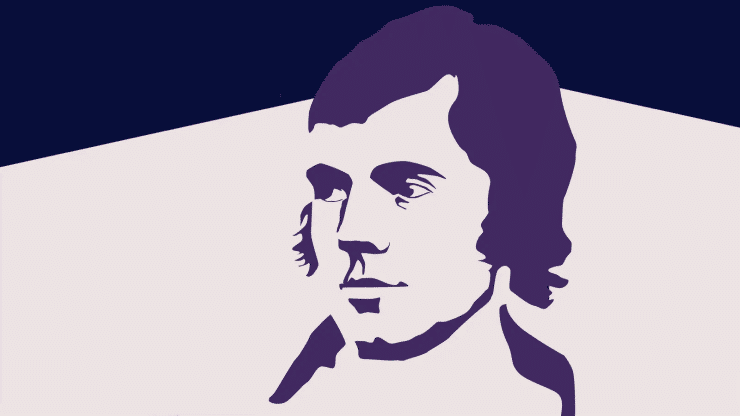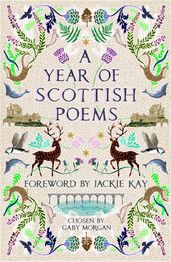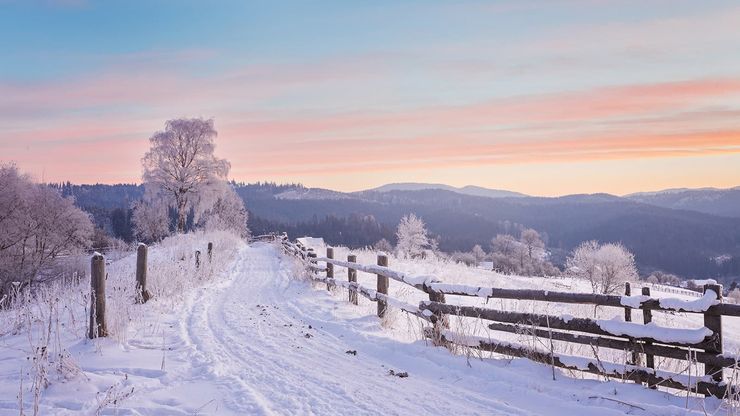Our favourite Robert Burns poems
From 'Auld Lang Syne' to some lesser known works, we've curated a selection of Robert Burns poems perfect for Burns Night celebrations.

Robert Burns, widely thought of as the national poet of Scotland, wrote some of the most popular and well-loved Scottish poems of all time. His life is celebrated around the world each year on his birthday, 25 January. We’ve curated a selection of Robert Burns poems taken from A Year of Scottish Poems, perfect for sharing at your Burns Night supper. Modern Scottish poets
Discover some of our other favourite poetry collections in our list of the best poetry books to read right now, or take a look at our list of some of our favourite Scottish poets.
A Year of Scottish Poems
by Gaby Morgan
This collection of 366 poems reflects on Scotland’s landscapes, history and people, and includes many of the country's most celebrated poets, from Robert Burns and Sir Walter Scott to Carol Ann Duffy.
The ‘Selkirk Grace’ is a well-known thanksgiving poem said before meals. It is usually said after guests have sat down to enjoy a Burns Night supper, before the first course is served.
Selkirk Grace
Some hae meat and canna eat,
And some wad eat that want it;
But we hae meat, and we can eat,
Sae let the Lord be thankit.
‘Address to a Haggis’ is traditionally recited on Burns Night after the haggis has been brought in and set on the table.
Address to a Haggis
Fair fa’ your honest, sonsie face,
Great Chieftan o’ the Puddin-race!
Aboon them a’ ye tak your place,
Painch, tripe or thairm:
Weel are ye wordy o’ a grace
As lang’s my arm.
The groaning trencher there ye fill,
Your hurdies like a distant hill,
Your pin wad help to mend a mill
In time o’ need,
While thro’ your pores the dews distil
Like amber mead.
His knife see Rustic-labour dight,
An’ cut you up wi’ ready slight,
Trenching your gushing entrails bright,
Like onie ditch;
And then, O what a glorious sight,
Warm-reekin, rich!
Then, horn for horn, they stretch an’ strive:
Deil tak the hindmost, on they drive,
Till a’ their weel-swall’d kytes belyve
Are bent like drums;
Then auld Guidman, maist like to rive,
Bethankit hums.
Is there that owere his French ragout,
Or olio that wad staw a sow,
Or fricassee wad mak her spew
Wi’ perfect scunner,
Looks down wi’ sneering, scornfu’ view
On sic a dinner?
Poor devil! see him owre his trash,
As feckless as a wither’d rash,
His spindle shank a guid whip-lash,
His nieve a nit;
Thro’ bluidy flood or field to dash,
O how unfit!
But mark the Rustic, haggis-fed,
The trembling earth resounds his tread,
Clap in his walie nieve a blade,
He’ll make it whissle;
An’ legs, an’ arms, an’ heads will sned,
Like taps o’ thrissle.
Ye Pow’rs wha mak mankind your care,
And dish them out their bill o’ fare,
Auld Scotland wants nae skinking ware
That jaups in luggies;
But, if ye wish her gratfu’ prayer,
Gie her a Haggis!
‘Auld Lang Syne’ is not only traditionally sung on New Year’s Eve, but is also included in Burns Night celebrations. Guests will stand, hold hands and sing together to bring the night to a close.
Auld Lang Syne
Should auld acquaintance be forgot,
And never brought to mind?
Should auld acquaintance be forgot,
And auld lang syne!
Chorus
For auld lang syne, my dear,
For auld lang syne,
We’ll tak a cup o’ kindness yet,
For auld lang syne.
And surely ye’ll be your pint stoup!
And surely I’ll be mine!
And we’ll take a cup o’ kindness yet,
For auld lang syne.
Chorus
We twa hae run about the braes,
And pou’d the gowans fine;
But we’ve wander’d mony a weary fit,
Sin’ auld lang syne.
Chorus
We twa hae paidl’d in the burn,
Frae morning sun till dine;
But seas between us braid hae roar’d
Sin’ auld lang syne.
Chorus
And there’s a hand, my trusty fiere!
And gie’s a hand o thine!
And we’ll tak a right gude-willie-waught,
For auld lang syne.
A Red, Red Rose
O my luve’s like a red, red rose,
That’s newly sprung in June:
O my luve’s like the melodie
That’s sweetly play’d in tune.
As fair art thou, my bonny lass,
So deep in luve am I;
And I will luve thee still, my dear,
Till a’ the seas gang dry.
Till a’ the seas gang dry, my dear,
And the rocks melt wi’ the sun
O I will luve thee still, my dear,
While the sands o’ life shall run:
And fare thee weel, my only luve!
And fare thee weel a while!
And I will come again, my luve,
Though it were ten thousand mile.
My Heart’s in the Highlands
Farewell to the Highlands, farewell to the north,
The birth-place of Valour, the country of Worth;
Wherever I wander, wherever I rove,
The hills of the Highlands for ever I love.
Chorus
My heart’s in the Highlands, my heart is not here;
My heart’s in the Highlands, a-chasing the deer;
A-chasing the wild-deer and following the roe,
My heart’s in the Highlands, wherever I go.
Farewell to the mountains high-cover’d with snow;
Farewell to the straths and green vallies below;
Farewell to the forests and wild-hanging woods;
Farewell to the torrents and loud-pouring floods.
O, Wert Thou in the Cauld Blast
O, wert thou in the cauld blast
On yonder lea, on yonder lea,
My plaidie to the angry airt,
I’d shelter thee, I’d shelter thee.
Or did Misfortune’s bitter storms
Around thee blaw, around thee blaw,
Thy bield should be my bosom,
To share it a’, to share it a’
Or were I in the wildest waste,
Saw black and bare, sae black and bare,
The desert were a Paradise,
If thou wert there, if thou wert there.
Or were I monarch o the globe,
Wi thee to reign, wi thee to reign,
The brightest jewel in my crown
Wad be my queen, wad be my queen.
John Anderson my Jo
John Anderson my jo, John,
When we were first acquent;
Your locks were like the raven,
Your bonny brow was brent;
But now your brow is beld, John,
Your locks are like the snow;
But blessings on your frosty pow,
John Anderson my jo.
John Anderson my jo, John,
We clamb the hill thegither;
And monty a canty day, John,
We’ve had wi’ ane anither:
Now we maun totter doun, John,
And hand in hand we’ll go,
And sleep thegither at the foot,
John Anderson my jo.



